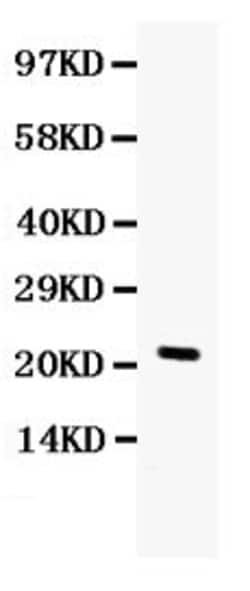Learn More
Invitrogen™ G-CSF Polyclonal Antibody
Rabbit Polyclonal Antibody
Supplier: Invitrogen™ PA595281
Description
Mouse G-CSF shares 77.2% amino acid (aa) sequence identity with human G-CSF. Reconstitute with 0.2 mL of distilled water to yield a concentration of 500 μg/mL. Positive Control - WB: HELA whole cell. Store at -20°C for one year from date of receipt. After reconstitution, at 4°C for one month. It can also be aliquotted and stored frozen at -20°C for six months. Avoid repeated freeze-thaw cycles.
G-CSF (Granulocyte colony stimulating factor) is a naturally occurring cytokine that stimulates the production and antibacterial function of neutrophils and monocytes. Human G-CSF is an 18.8 kDa protein containing 175 amino acid residues, and a soluble isoform of the G-CSF receptor has been described. The pleotropic cytokine is produced by activated monocytes, macrophages, endothelial cells, fibroblasts, astrocytes, osteoblasts and bone marrow cells. G-CSF has been shown to have specific effects on the proliferation, differentiation and activation of hematopoietic cells. G-CSF is also expressed by various transformed cells such as carcinoma cells and myeloblastic leukemia cells. G-CSF is encoded by two distinct DNA sequences, resulting in a full size, high activity and a shorter, low activity isoform of G-CSF. G-CSF is highly conserved among species and has been shown to exert its biological functions through interaction with its receptor expressed on the surface of hematopoietic progenitors, neutrophilic granulocytes and certain carcinoma cell lines. Clinical use of G-CSF has been approved for several therapeutic applications, treatment of neonatal infections, therapy of acute myocardial infarction, granulocyte transfusion in patients with neutropenia, in severe infections and sepsis, therapy in chronic autoimmune neutropenia, treatment of acute myeloid leukemias, Sweet's syndrome and AIDS. Further, G-CSF has been shown to be a marker protein for different carcinomas such as bladder cancer and dysfunction of the protein has been linked to Kostmann Syndrome.
Specifications
| G-CSF | |
| Polyclonal | |
| Unconjugated | |
| Csf3 | |
| C17orf33; colony stimulating factor 3; colony stimulating factor 3 (granulocyte); CSF 3; CSF3; CSF3OS; Csfg; filgrastim; GCSF; G-CSF; Granulocyte colony-stimulating factor; granulocyte-colony stimulating factor; gsf3; lenograstim; MGC45931; MGI-IG; Pluripoietin; RP23-395E10.4 | |
| Rabbit | |
| Antigen affinity chromatography | |
| RUO | |
| 12985, 1440 | |
| -20°C | |
| Lyophilized |
| ELISA, Western Blot | |
| 500 μg/mL | |
| PBS with 5mg BSA and 0.05mg sodium azide | |
| P09919, P09920 | |
| Csf3 | |
| E.coli-derived mouse G-CSF recombinant protein (Position: R47-A208). | |
| 100 μg | |
| Primary | |
| Human, Mouse | |
| Antibody | |
| IgG |
Safety and Handling
Your input is important to us. Please complete this form to provide feedback related to the content on this product.
